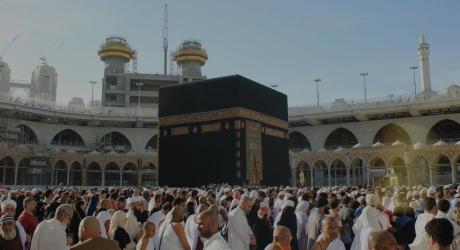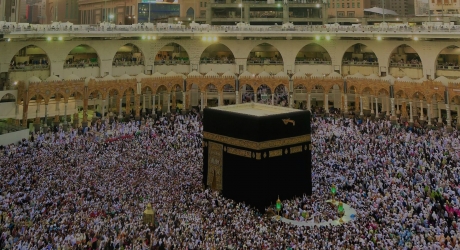Fasting is prescribed once a year, in the month of Ramadhan. One fasts every day of the month, from the first light of dawn until sundown. During that time one abstains completely from food and drink. According to the Qur'an, there are two purposes of fasting (Quran, 2:183,185):
1. To make one cautious in life.
2. To make one thankful to God.
Food and drink is man's most basic necessity. When he is consumed by hunger and thirst, he sees how weak he really is; he realizes how much he is in need of the succor of God. This experience makes him aware of his duties as God's humble servant. This feeling leads to caution in life. Then in the evening, when he eats and drinks, he sees how God has made complete provision for his needs. His heart is filled with gratitude. He praises God, and offers thanks to Him.
The Prophet is reported as saying that God rewards good deeds from tenfold to seven hundred-fold. His reward for fasting, which is especially for Him, will be infinite. In another Hadith he is reported as saying, "There are many who fast and receive nothing in return, but hunger and thirst."
What is the difference between one fast and another, while in appearance both are alike? In actual fact, the appearance is not all that there is to it. The act serves only as a symbol of the essence. One who observes fasting in its essence as well as in its outward form, will deserve the promised reward. On the other hand, one who attaches importance to symbols alone, will have nothing to his credit when he comes before God. Fasting of the second type is of no value in the eyes of God, since the true value of something which is symbolic in its nature is always determined by the will to virtue which it represents.
The outward form of fasting is to abstain from food and water. This abstinence symbolizes the fact that man is at God's disposal. He should, therefore, be willing, at all times, to sacrifice anything for His sake; even if it involves relinquishing such basic necessities as food and water.
Obviously one who refrains from taking food and water on specific days, but does not do likewise regarding other things forbidden by God, like telling lies, persecuting his fellowmen, perpetrating injustice and so on, mistakes the symbols for the essence, appearance for reality. Such a man cannot expect to deserve a reward from God.
The real fast is that of one whose whole life is cast in the same consistent mould: who applies in all his affairs, the constraints and bounds that God has laid down, who checks his tongue from abusing others, who stays his hand from persecution, who halts in his steps towards injustice. As the Prophet said, "Such a man can be likened to a horse tied to his rope, who moves only as far as his string permits him." (Musnad Ahmad, Hadith No. 11335) He cannot transgress.
The essence of fasting thus is to eschew all evil ways throughout the year. The true fast is that from which one learns a lesson.









